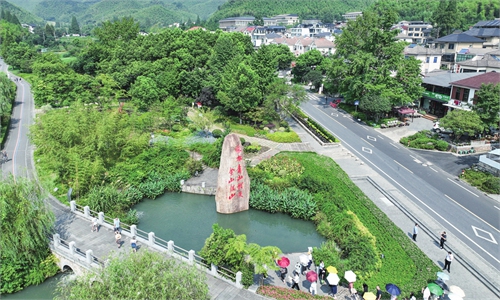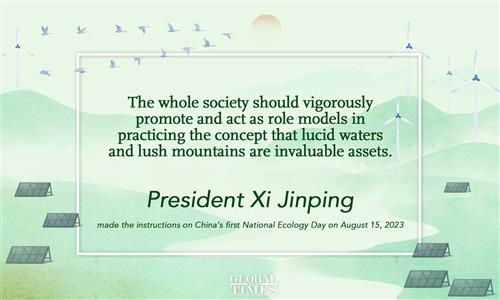Xi's moment: National Ecology Day debuts to raise awareness, commitments
Ecological conservation vital to sustainable devt of Chinese nation: Xi

People are kayaking and paddleboarding on Jinxi River in Jiangle county, East China's Fujian Province on August 15, 2023, the country's first National Ecology Day. Jiangle has a forest coverage rate of 81.3 percent and is a key eco-protection site. Photo: cnsphoto
Verdant villages prospering in eastern China's Zhejiang Province, Yangtze finless porpoise, also called the "panda in the water" for its rarity, being spotted more often in rivers, scientific expedition team members seeing lakes on the Qinghai-Xizang Plateau with clearer water… all these significant changes over the past decades have marked China's continuous efforts to achieve a core concept that "lucid waters and lush mountains are invaluable assets," which gave inspiration to the country's first National Ecology Day.
On August 15, China's first National Ecology Day, Chinese President Xi Jinping has urged the whole society to vigorously promote and act as role models in practicing the concept that lucid waters and lush mountains are invaluable assets.
Ecological conservation is of vital importance for the sustainable development of the Chinese nation, Xi said.
On the new journey of building a modern socialist country in all aspects, efforts should be made to maintain strategic resolve in advancing ecological progress and promote high-quality development in sync with high-standard protection, Xi said.
With a focus on carbon peaking and carbon neutrality, the country should facilitate the gradual transition from dual control over the amount and intensity of energy consumption to dual control over the amount and intensity of carbon emissions, Xi noted.
The country has already set ambitious goals of peaking carbon emissions by 2030 and achieving carbon neutrality by 2060.
Observers believe that the National Ecology Day will not only help raise ecological awareness across society, but also provide an opportunity to share China's story of ecological civilization construction with the international community, allowing better participation in global environmental and climate governance.
Today marks the inaugural National Ecology Day, a pioneering and symbolic commemoration, reflecting the significant position of ecological civilization construction in the new era, Wang Wenbin, spokesperson of the Chinese Foreign Ministry, said at a press conference on Tuesday. It embodies the steadfast determination to promote the construction of a Beautiful China and also demonstrates China's firm stance in actively participating in global environmental and climate governance, as well as its commitment to fostering a shared future for humanity.
Vigorous efforts
According to a bluebook on China's ecological conservation red lines released by the Ministry of Natural Resources on Tuesday, the red line of ecological conservation is approximately 3.19 million square kilometers, covering all 35 priority areas for biodiversity conservation in China and over 90 percent of typical ecological system types.
The ecological conservation red line refers to areas within an ecological space that have particularly important ecological functions and must be strictly protected on a mandatory basis, including water conservation, biodiversity maintenance, soil and water conservation, windbreak and sand fixation, and coastal ecological stability, as well as environmentally sensitive and fragile areas prone to soil erosion, land desertification, rock desertification and salinization.
China is a mega-diverse country in terms of biodiversity. The protection of biodiversity has been elevated to a national strategy and has become a consensus and action for the entire society, Ma Jun, director of the Beijing-based Institute of Public and Environmental Affairs, told the Global Times on Tuesday.
"Over the past years, China has actively promoted biodiversity conservation, taking a series of robust measures, including the innovative establishment of the ecological conservation red line system," Ma said.
"Based on what we have observed, the demarcation of the ecological red line has been essentially completed across the entire country," he added.
Besides drawing the red lines, Chinese authorities make full use of resources such as satellites, manned and unmanned aircraft, fixed ground and mobile patrol monitoring to construct an integrated ecological quality monitoring network from "sky to ground," according to the Ministry of Ecology and Environment.
Those monitoring measures focus on natural reserves, ecological conservation red lines and key ecological function areas, Huang Runqiu, head of the ministry, told a press conference on July 27.
More than over 5,000 key issues were identified in national nature reserves, and 79 ecological damage issues were found in five pilot provinces with ecological conservation red lines up to July 27.
Currently, China has over 30 laws on ecological and environmental protection, more than 100 administrative regulations, and over 1,000 local regulations, the National People's Congress said in a post on Tuesday. They lay a solid foundation for establishing and improving the system of ecological civilization.
Chinese authorities released a guideline on Tuesday to enhance the integration of law enforcement and administering justice in forestry and grassland affairs.
Jointly issued by the Supreme People's Procuratorate and the National Forestry and Grassland Administration, the guideline is centered on building a coordination mechanism for administrative law enforcement and prosecutorial public interest litigation in forestry and grassland affairs.
In the past decade, the national forest coverage rate increased from 21.63 percent to 24.02 percent, according to a statement sent by the National Forestry and Grassland Administration to the Global Times on Tuesday.
China has contributed one quarter, the most in the world, to the increase in global green coverage. Grasslands have an overall vegetation coverage of 50.32 percent and their status has transformed from production to ecological purposes, the authority said.
Core concept
As the birthplace and first demonstration site of the concept that "lucid waters and lush mountains are invaluable assets," residents in East China's Zhejiang Province, especially Huzhou, have a more vivid experience of the concept.
Huzhou's Yucun village, previously the largest limestone mining area in Anji county, is an example as it transformed the local economy from mining to greener industries.
The air in the village used to be shrouded with coal dust and the green bamboo leaves on the mountains were covered in soot. Miners who came out of the mines looked all the same - all covered in black.
The change started in 2002 when Yucun village began shutting down the mines. The momentum of green development became stronger after Xi, then Party Chief of Zhejiang, raised the "two mountains" concept on August 15, 2005 during his inspection trip to the county.
Nowadays, former miners are able to wake up breathing fresh air every day and have sought out ways to make a living in industries related to eco-tourism, such as running guest houses and shops, as well as high-tech agriculture.
The "lucid waters and lush mountains are invaluable assets" concept for local people is that they are able to enjoy beautiful and green ecology and at the same time live an abundant life, Chen Guangju, the deputy head of the "Two Mountains" Concept Research Institute affiliated with Huzhou University, told the Global Times.
What other places can learn from the Zhejiang experience is that the practice should first prioritize ecology and seek a development path that fits local conditions so as to reach the goal of common prosperity, Chen said.
The "two mountains" concept is and will lead to a new form of human civilization, Chen said.
China's ecological governance approach not only addresses domestic environmental issues but also has a positive impact on global sustainable development and climate management, Sun Shao, a senior researcher at Chinese Academy of Meteorological Sciences, told the Global Times on Tuesday.
China's practices in ecological restoration and sustainable development can offer insights and lessons for other countries, propelling worldwide environmental conservation efforts, Sun said.
"Through collaborative initiatives, technology sharing and international cooperation, China plays a vital role in global environmental management, contributing to addressing global challenges such as climate change," he added.






